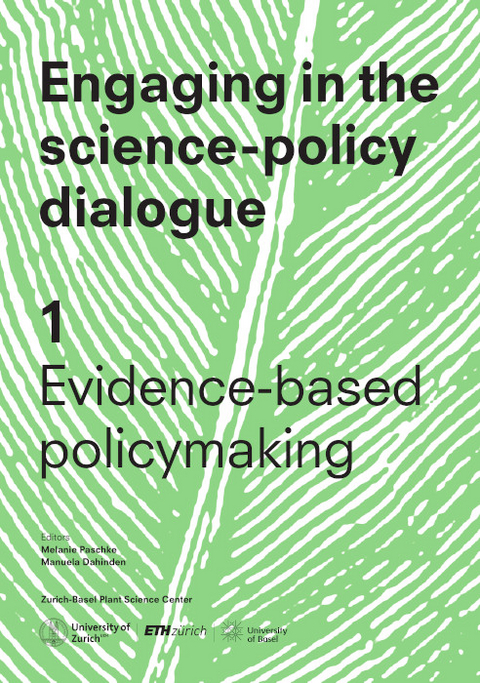
Engaging in the science-policy dialogue
Idea (Verlag)
978-3-88793-173-5 (ISBN)
6 Zurich-Basel Plant Science CenterEngaging in the science-policy dialogueEvidence-based policymakingGuide to workbook 1The aimWorkbook 1 introduces you to the concepts of evidence-based policymaking. We discuss the role of science in the policymaking context. You will learn about methods and tools to improve the science-policy dialogue. Competencies• You understand the concept of evidence-based policymaking.• You know other factors that interplay in policymaking aside from evidence.• You can formulate and implement criteria for good policy advice in your daily work.• You can formulate a policy brief or fact sheet.How to read this workbookINTRODUCTIONThe introduction to the workbook series explains important concepts from policy sciences: First, it introduces the elements of the political system. It elaborates on some of the guiding principles of modern democracies and governance.THEORYSetting the sceneWe make you aware of how the role of scientific evidence in policymaking is seen differ-ently by scientists and policymakers. We present statements of their points of view and controversial examples where scientific evidence has or has not been implemented in the decision-making process.Self-reflectionHow do you as a scientist define your role in the decision-making context? Is it Pure Scientist, Guide to workbook 1 Zurich-Basel Plant Science Center 7Engaging in the science-policy dialogueEvidence-based policymakingGuide to workbook 1Issue Advocate, Science Arbiter or Honest Broker? Whatever role you have chosen: it can drive the types of interaction that you will engage in: is it individual engagement or community engagement through boundary organizations?Knowledge about types of evidenceWhat evidence is used in the policymaking process? You will learn how to use different types of knowledge, including systems knowledge, target knowledge, transformation knowledge and evaluation knowledge.Key principles for giving policy adviceHow will research evidence be validated within the policymaking process? Validation in so-ciety should follow the principles of credibility, salience and legitimacy.The policy environmentYou will analyze factors that interact with policymaking by considering the example of ge-netically modified organisms. You will understand how scientists and policymakers can work together.COMMENTTrends and challenges of environmental governance we explain in more detail.TOOLSScientific evidence can be produced with different tools, from experimentation to interviews. Quantitative and qualitative interviews are regularly used to get some insight into stakehold-ers’ perspectives.Scientific evidence needs to be communicated in forms that are accepted by policymakers. We provide two instruments that can facilitate the communication process in a timely manner: the policy brief and a fact sheet.EXAMPLESWe present three case studies from Switzerland that explain at what stages and in what forms scientific evidence was implemented in the policymaking process.
| Erscheinungsdatum | 27.10.2019 |
|---|---|
| Zusatzinfo | mit 13 Abbildungen und Diagrammen |
| Sprache | englisch |
| Maße | 150 x 210 mm |
| Themenwelt | Naturwissenschaften ► Biologie ► Botanik |
| Schlagworte | Forschungsmethoden • plant science • wissenschaftliche Forschung |
| ISBN-10 | 3-88793-173-4 / 3887931734 |
| ISBN-13 | 978-3-88793-173-5 / 9783887931735 |
| Zustand | Neuware |
| Haben Sie eine Frage zum Produkt? |
aus dem Bereich


